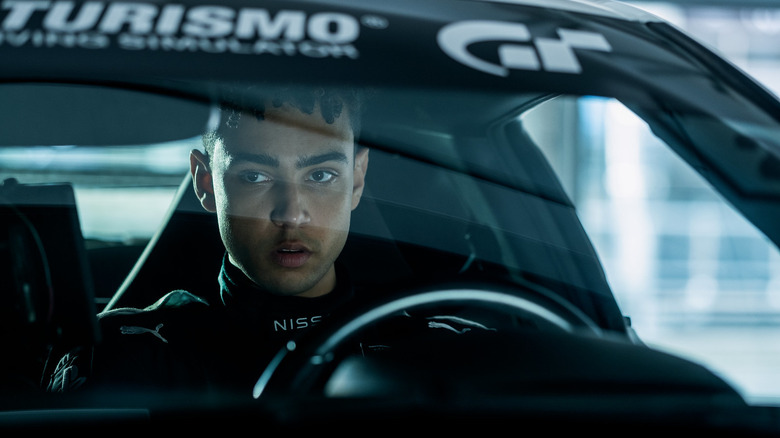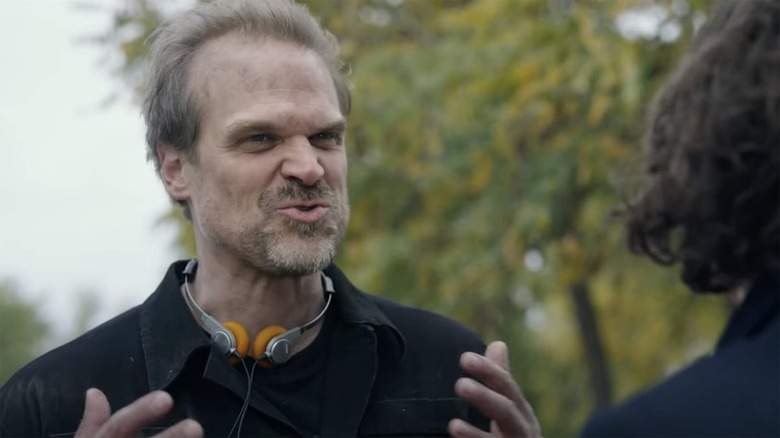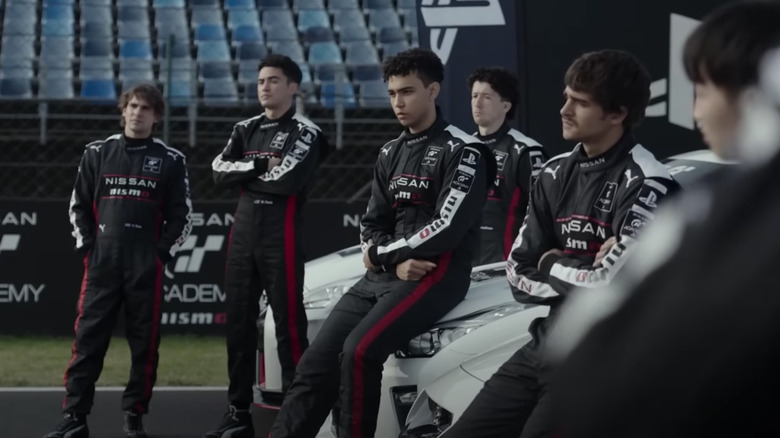Gran Turismo Review: A Racing Biopic That Crashes And Burns
- David Harbour rises above the sports movie cliches
- More of a shameless feature-length commercial than an underdog sports biopic
- Badly staged, incoherent race scenes with no sense of geography
2023 is the year of the brand biopic in the movies — thinly-veiled commercials for world-famous companies and products that have been reimagined as against-all-odds success stories. After cheering on those underdogs at corporations such as (checks notes) Nike, Nintendo, and Frito-Lay, now audiences will be encouraged to root for another unlikely business victory, which is ingeniously designed as a stereotypical rags-to-riches sports movie.
At first glance, you could be forgiven for thinking that director Neill Blomkamp's "Gran Turismo" is most invested in the trajectory of Jann Mardenborough (Archie Madekwe), a gamer who defied the odds to achieve success on the racetrack. Closer inspection reveals that the filmmaker and his screenwriters Jason Hall and Zach Baylin could have adapted any of the success stories from the GT Academy to the same results; it's less invested in the driver's story beyond its broadest strokes than it is in highlighting just how big a risk it was for a car manufacturer to invest in the world of video gaming.
Not a video game movie — and all the worse for it
Thanks largely to David Harbour's supporting turn as Mardenborough's cantankerous trainer Jack Salter, the movie hits all the expected sports movie beats as this unlikeliest of drivers overcomes all adversity to achieve a podium finish in a major race. The various narrative cliches of the genre are far easier to stomach every time the "Stranger Things" star is onscreen, his big scenes correlating with the moments the film feels like a genuine racing drama, albeit one at its most conventional, and not a feature-length corporate extension designed to make audiences think of "Gran Turismo" as more than just a game.
His character is still an archetype of the genre, of course, but that's enough to give the film the illusion of dramatic weight; frequent pauses to highlight the game's humble origins and the various "brand initiatives" by Nissan to get gamers behind the wheel brought me crashing back down to Earth. It may be a shamelessly corporate year at the movies, but the other brand biopics I mentioned were far better at hiding their raison d'être than this.
We're introduced to Jann as a teenager struggling to make the shift into a world of adult responsibility. Constantly playing his "Gran Turismo" games, his father (Djimon Hounsou) wonders when he's going to leave his bedroom and get a real job, while his mother (Geri Halliwell — yes, we do mean Ginger from the Spice Girls) is quite understandably baffled as to why he dropped out of a university engineering degree if he wants a career working with cars.
Naturally, he soon proves them wrong when chosen to compete in a gaming competition organized by Danny Moore (a wooden Orlando Bloom), where the winner will get to attend GT Academy and train to become a racer. For a character who wanted to become one without bothering to put in any of the work required to get there, much to the chagrin of his parents, it's a once-in-a-lifetime chance to prove them wrong. Of the little credit I will afford the film, it's that this isn't an easy transition, following the "Rocky" rule of making the smallest of victories on this tough journey feel more impactful.
Corporate biopic disguised as an underdog sports movie
Most of the movie is taken up by this stereotypical sports movie narrative, but through the small details along the way, it's still an advertisement for what is frequently described by characters as not just a game, but a "realistic racing simulator." Take one early race at the academy where Jann's brakes fail, causing an accident — he's proven right in his assessment that he wasn't at fault because he has extensive engineering knowledge through playing "Gran Turismo."
It's a bizarre moment designed to prove any characters who believe he should have studied and trained in the relevant fields wrong, showing that all you need to do to succeed behind the wheel is to be skilled with a console controller, and reaffirming to any budding drivers in the audience that by picking up the game themselves, they could have a similar career path. Even when he loses races, he makes a comeback shortly afterward by relearning the lessons from the game, imagining he's back on the virtual racetrack so he can glide ahead of rivals who would be embarrassed to be seen with a PlayStation (it's telling that we never see who comes first in each major race, just who comes directly behind him as he gets to record third or fourth place finishes). He performs best when he remembers what the "racing simulator" taught him — extensive product placement for video games doesn't come more shameless than this.
To visualize how Jann is only a success because of his video game obsession, Blomkamp transforms each racing track with the iconography of the "Gran Turismo" games — an arrow above his vehicle stating where he is in the leaderboard at any given moment, for example. But this fails to hide that the filmmaker can't even bring these races to life with the same effectiveness as the game itself, due to intensive, fast-paced editing that has no grasp on the geography of each track; we frequently jump forward to new locations in every cut from the driver's seat. The film is so quick to get to the finish line in these sequences that it doesn't build the tension it needs.
As Jann starts racing in major competitions, Blomkamp goes overboard with awkward drone shots of spectators and different bends on the tracks. The editing is so frenetic that it can often be difficult to establish where in the race we are. This only becomes clear in the grand finale, at the Le Mans 24-hour race, and that's largely because it follows a narrative trajectory identical to "Ford v Ferrari" — if it weren't for seeing that film, the route would be as incomprehensible as every other racing sequence here. There's a way to make racing cinematic and understandable to the viewer through editing without the need to resort to the boring choice of mimicking the game's driver's-seat POV. Blomkamp seems invested in making his races visually stylish rather than coherent.
I suspect audiences will be less harsh on "Gran Turismo" than me; it hits all the stereotypical underdog sports movie beats that have traditionally made for the genre's most successful crowd-pleasers. But it was much harder for me to overlook the film's shamelessly corporate nature than I expected — an embarrassing low point in a year already infamous for the number of barely concealed commercials that have wound up on our screens.
"Gran Turismo" arrives in theaters on August 25.
This piece was written during the 2023 WGA and SAG-AFTRA strikes. Without the labor of the writers and actors currently on strike, the film being covered here wouldn't exist.


